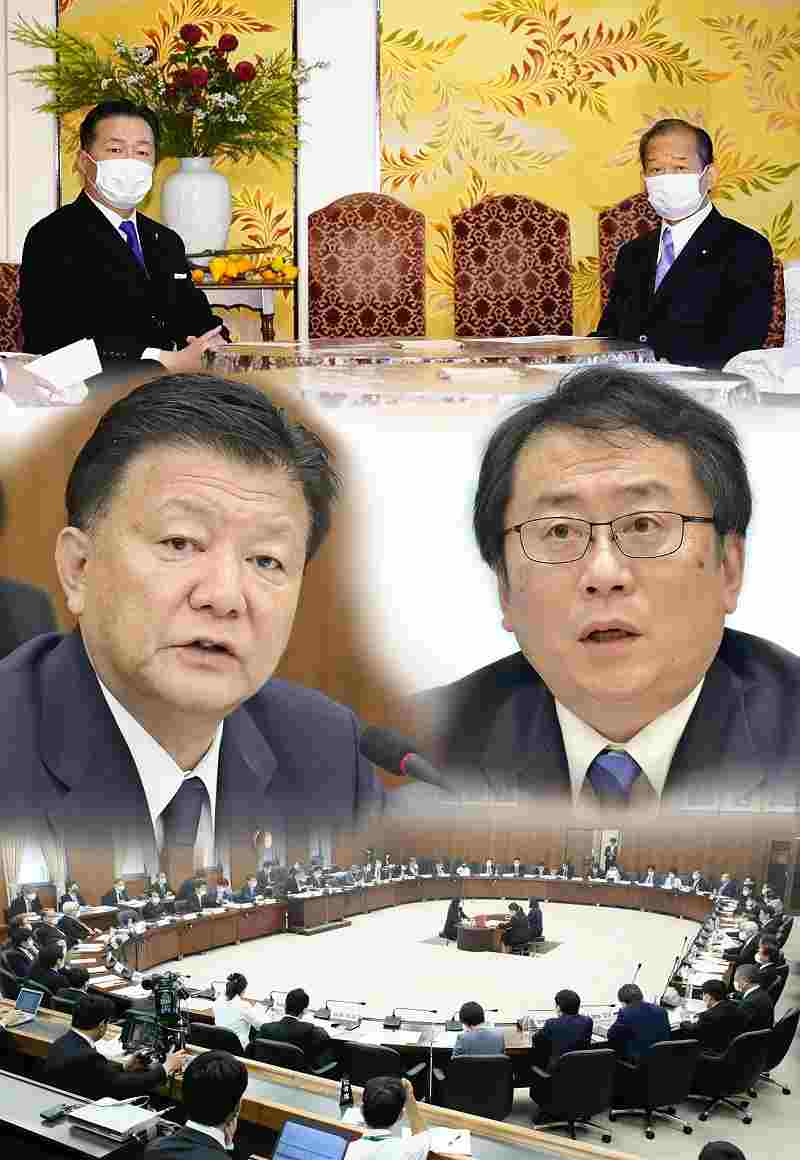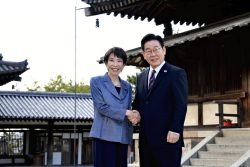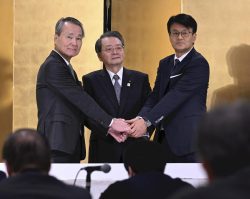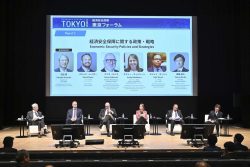After 3 years of gridlock, CDPJ about-face opens door to vote on referendum law

(Clockwise from top left) Tetsuro Fukuyama, Toshihiro Nikai, Ikuo Yamahana and Yoshitaka Shindo
15:09 JST, May 3, 2021
Monday marked 74 years since the Constitution came into effect. The Diet has started moving toward a vote on proposed amendments to the National Referendum Law. How will the constitutional revision debate change in the wake of last year’s change of prime minister and realignment of the opposition parties?
This is the first installment in a series that explores the actions and aims of the political parties.
It was around noon on April 28 and the air was heavy with tension in the lower house lawmakers’ office building in Tokyo, where the Constitutional Democratic Party of Japan’s research council on the Constitution was holding its first meeting of 2021.
The 20 or so members were discussing how to respond to the ruling Liberal Democratic Party’s push to bring to a vote the proposed amendments to the National Referendum Law, which had been deliberated at the Commission on the Constitution of the House of Representatives.
Many were ardently opposed. “We shouldn’t budge from our position,” one said. Another added, “We mustn’t accept holding a vote.”
This put Ikuo Yamahana, chief of the research council and head of the opposition party bloc in the commission, in a quandary. In December, LDP Secretary General Toshihiro Nikai and his CDPJ counterpart Tetsuro Fukuyama had agreed to “reach some kind of conclusion” on the revision bill during the current Diet session.
The amendments already had gone through four question-and-answer sessions over a combined three hours.
At the meeting, Yamahana presented his own plan. Referring to the CDPJ’s call for rules regulating TV advertising during the referendum campaign period, he sought to insert a supplementary provision in the bill that would require looking into changing the law in regard to the TV ad aspect, over the target of the next three years.
Yamahana wanted the attendees to agree that if the LDP accepted this CDPJ point, the party would support the amendments. But some remained defiant. Whenever someone spoke up against his plan, Yamahana bowed his head and said, “Please find a way to bring yourself to accept this.” The meeting ended after one hour.
Yoshitaka Shindo, an LDP lawmaker who heads the ruling party side of the commission, was slightly surprised when Yamahana contacted him. Shindo did not expect the CDPJ, which had so far refused to even agree to a vote, to change its attitude.
When Yamahana said his party wanted to alter the proposed amendment to include the ad issue, Shindo replied, “I think we can make sure that gets done.” A major step had been taken toward holding a vote at the commission’s next meeting on May 6.
Until then, Shindo had been feeling the heat on this matter. Given that the Diet session is scheduled to end on June 16, it was imperative to send the bill on the proposed amendments to the upper house as soon as possible. Shindo had repeatedly called Yamahana’s mobile phone in order to set up talks on holding the vote.
Shindo initially aimed to have the vote decided upon at the commission’s meeting on April 22, but until then Yamahana had brusquely refused.
The bill on the proposed amendments was submitted to the lower house in June 2018, and for nearly three years, has ended up being carried over to subsequent sessions. This is the ninth consecutive Diet session the bill has been on the agenda.
As a lower house election must be held by this autumn, the possibility of the bill being scrapped remains. The opposition Nippon Ishin no Kai (Japan Innovation Party) and Democratic Party for the People both support holding a vote on the proposed amendments soon.
The bill includes changes that make it easier to vote, such as allowing polling stations in commercial facilities when holding a national referendum on constitutional revisions. Such polling stations are already used in national and local elections, so this issue appears unlikely to be a deal-breaker.
Even so, the unique format under which the commission operates was why the CDPJ’s view cannot be ignored. A premium has been placed on securing smooth agreements between the ruling and opposition parties. This approach has been dubbed the “Nakayama method,” after Taro Nakayama, a former head of the commission.
This method was intended to enable discussions in a calm environment free from the surrounding political situation. It hasn’t always worked that way. “The opposition parties gradually ended up using this as an excuse for refusing to hold any deliberations,” a senior LDP official told The Yomiuri Shimbun.
The CDPJ did not accept the start of deliberations on the proposed amendments until last November, a few months after the resignation of former Prime Minister Shinzo Abe, who had long championed amending the Constitution.
Up to then, the party had taken its stance in thinly veiled consideration of the Japanese Communist Party, which opposes revising the nation’s top law and often joins hands with the CDPJ in elections.
Other opposition parties have voiced frustration over the CDPJ’s stance. At the commission’s April 22 meeting, Ishin no Kai Secretary General Nobuyuki Baba blasted the CDPJ, saying, “Some political parties have abandoned common sense and intentionally turned the issue into a political game.”
At a press conference on April 19, the LDP’s Nikai pressed the CDPJ to keep its word and go ahead with calling for the vote. “They should show the Diet’s intent, both inside and outside of the country,” Nikai said.
Some CDPJ members are afraid that the party may pay a price for its stubbornness. “The public will criticize us,” a young member said.
On April 28, for the first time in three years and two months, the upper house’s Commission on the Constitution, upon receiving the proposed amendments from the lower house, held its first substantive deliberations. At long last, the CDPJ has started to take action.
"Politics" POPULAR ARTICLE
-

Japanese Language Requirement Eyed for Permanent Residency Status; LDP Plans Revisions of Laws on Foreigners
-
-250x167.jpg)
Japan Eyes Plan to Accept Up To 1.23 Mil. Foreign Workers by End of Fiscal 2028
-

AI-Driven ‘Zero Clicks’ Phenomenon Threatens Democracy; News Outlets Must Be Able to Recover Costs, Stay Independent
-

Japanese Public, Private Sectors to Partner on ¥3 Tril. Project to Develop Domestic AI, SoftBank to Be Key Firm Involved
-

Japan’s Defense Ministry to Extend Reemployment Support for SDF Personnel to Age 65; Move Comes Amid Ongoing Labor Shortage
JN ACCESS RANKING
-

As Chinese Tourists Shun Japan, Hotels and Stores Suffer
-

Core Inflation in Tokyo Slows in December but Stays above BOJ Target
-

BOJ Gov. Ueda: Highly Likely Mechanism for Rising Wages, Prices Will Be Maintained
-

Osaka-Kansai Expo’s Economic Impact Estimated at ¥3.6 Trillion, Takes Actual Visitor Numbers into Account
-

Japan Govt Adopts Measures to Curb Mega Solar Power Plant Projects Amid Environmental Concerns



























